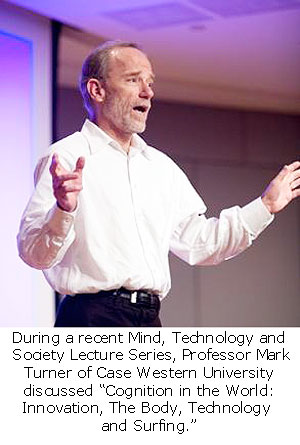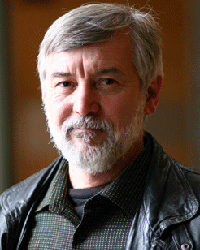

Professor
Teenie Matlockrecalls trying to generate the right name for a new
cognitive sciencelecture series at UC Merced back in 2005.
“It was important to emphasize the basis of cognitive science but at the same time capture its breadth and impact on other disciplines,” she said. “It made sense to start with ‘mind,’ because thinking underlies other dimensions we wanted to feature in the series: technology and society.”
With that, the Mind, Technology and Society Lecture Series (MTS) was established. It has become one of the campus’ longest-running series, drawing scholars from across the country. The series has also exposed visiting speakers to UC Merced and its cognitive science group.
At first, founding UC Merced deans Kenji Hakuta, of the School of Social Sciences, Humanities and Arts, and Jeff Wright, of the School of Engineering, helped fund the interdisciplinary series. In 2008, Matlock received support from Robert J. Glushko, a Silicon Valley entrepreneur who had funded cognitive science activities at other UC campuses and in the larger cognitive science community.
“Bob was impressed with the entrepreneurial spirit of our young program,” Matlock said. “He encouraged me to write a proposal that requested, among other things, support for world-class scientists to visit our campus as part of the lecture series. The Glushko-Samuelson Foundation responded with $50,000 of funding for cognitive science activities at UC Merced.”

Robert J. Glushko, president of the Glushko-Samuelson Foundation and adjunct professor in the UC Berkeley School of Information.
With support from Glushko and from the UC Merced administration, the series has met its stated goals, including promoting cognitive science on campus and in the community. Graduate students attend talks for credit, and occasionally community members come to listen to the speakers. Matlock said undergrads also enjoy attending MTS and are always welcome.
There have been some unexpected benefits, too.
“Our preeminent speakers return to their own research universities, talk up our cognitive science program and mention how wonderful it is to be at a brand new UC,” Matlock said. “In this way, the talk series has also boosted the visibility of our campus. Some graduate
studentshave even applied to UC Merced because they heard about us through these channels.”
Matlock still oversees the talk series, now in its fifth year, but her colleagues take turns creating new themes and choosing speakers. This semester, adjunct professor
Paul Maglio, manager at IBM Research and well-known expert in the field of service science, has chosen the topic “Cognitive Science in the World.” The roster of speakers includes scholars and scientists from a broad variety of fields.
- Stanford’s Herbert Clark, who studies cognitive and social processes involved in conversation, spoke Sept. 13.
- UC Merced professor
Stefano Carpin, who conducts research on social, cognitively inspired robots, spoke Oct. 4. - Ross Hammond of the Brookings Institution, an economist who does computational modeling of large-scale social systems, spoke Oct. 11.
- Mark Turner of Case Western University, a leading figure who connects cognitive science to the humanities and arts, spoke Oct. 18.
- UC Merced’s Dean of Social Sciences, Humanities and Arts and archaeologist Mark Aldenderfer, will speak Nov. 1.
The series continues with a full schedule of distinguished speakers through Dec. 6. Professor Michael Spivey will organize the MTS Lecture Series for Spring 2011.






